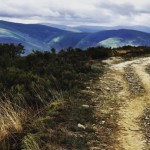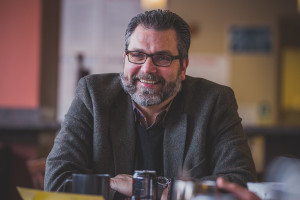
November 22, 2015
The Way of Jesus: A Journey Through Luke Part 6: What Kind of Soil Are You?
Rev. Eric Elnes, Ph.D.
Scripture: Luke 8:1-21
When most people consider Jesus’ Parable of the Sower in Luke 8, they presume that the seeds cast by the sower are us. Some of us find ourselves on the hard trodden path unable to take root, vulnerable to being picked off by the birds of the air. Others of us fall among the rocks or thorns, never realizing our potential, while a few land in good soil, finding the nutrients we need to thrive and bear fruit. Yet Jesus states plainly that the seeds are not us. They represent “the word of God.” We are the soil.
In other words, the word of God sometimes finds our hearts so pre-hardened that, like falling on a trodden path, that word never gains entrance. Other times God’s word to us is welcomed readily and gladly, but superficially. Like falling amidst rocks or thorns, that rootless word of grace is swept away at the first sign of trouble, or it is is quickly choked off by thorny fears and myriad distractions. Sometimes, though, we hear God’s word and it pierces us deeply enough to take root, growing and shaping our very lives with its graces. The central question raised by Jesus’ parable is “What kind of soil are you?”
Jesus tells us what makes for good soil: “An honest and good heart that brings forth fruit with patience.”
“Honest’ is not just a casual word thrown in here. As Bruce Van Blair observes in his excellent commentary on Luke (The Believer’s Road, pp. 78-79), “being honest with ourselves is the first essential ingredient of every authentic spiritual path.” We can’t get anywhere if we do not learn to “see it straight and call it straight.” Honesty is always the beginning of true repentance. “The heart must be changed to be ‘good.’”
This Thursday many Americans will say grace before enjoying a traditional Thanksgiving meal, thanking their Creator for the abundance of the land. Perhaps, too, they will be vaguely aware and maybe even grateful for the first Thanksgiving meal shared in 1621 between the Plymouth Colony Pilgrims and the Wampanoag Indians. Yet if we are to take an honest look at our holiday observance, “seeing it straight and calling it straight” in order to reap a true spiritual harvest from the holiday (i.e. “holy day”), then our Thanksgiving prayers might best start with a confession. We would confess that we are not adequately thankful for the boldness and courage of the Wampanoag, whose decision to welcome and aid the desperate pilgrims who landed on America’s shores stands in stark contrast to the twenty-six governors who recently vowed to turn away all Syrian refugees who seek passage to America today.
I’m not trying to turn a Thanksgiving message into a political one. I’m just trying to stay honest with myself as I observe the Thanksgiving holiday this year. Perhaps this is your goal, too. If honesty a vital component to being the “good soil” in which God’s word takes root, grows, and bears fruit, then what results from an honest look at the parallels between the original Thanksgiving and our own can only be nourishing and ultimately uplifting, not condemning.
Like Syrian refugees today, many of the pilgrims left everything behind to escape religious persecution. And like many of us today, the Wampanoag surely would have debated their response to the starving pilgrim refugees – whether to aid or resist them – in light of the potential threat they posed if allowed to establish themselves here. While the majority of the pilgrims may have been good-natured, peaceful people, not all of them were. And the pilgrims carried weapons with them, the likes of which the Wampanoag had never seen before – canons, matchlock muskets, and the iconic blunderbuss. How could they be sure these weapons would not eventually be directed against them?
We know in hindsight that whatever safety concerns the Wampanoag may have harbored were well-founded. Were they naïve? Were the Wampanoag so moved by the pilgrims’ heart-wrenching need that they did not adequately consider the possible drawbacks to their generosity?
My guess is that the Wampanoag were a lot wiser than many imagine. We are the naïve ones.
In his Sermon on the Mount, Jesus teaches, “Do not resist an evildoer. But if anyone strikes you on the right cheek, turn the other also.” (Matt 5:39) Jesus’ teaching seems overly naïve to many. Yet Jesus knew more about the nature of evil than most people do. Jesus knew that while evil’s desire may be to destroy us, its most effective strategy – the one few of us anticipate – is to tempt us to unwittingly destroy ourselves.
Evil wins when we become so afraid of evil that we commit evil acts to protect ourselves from it. Without doubt, a handful of terrorists will enter our country amidst the tens of thousands of innocent and honest Syrians that could be admitted. And the prospect of admitting even a few terrorists, frankly, is scary to any reasonable and rational person. Yet while refusing to grant safe harbor to all Syrian refugees may keep a handful of nefarious ones from harming us, following this course of action ensures that the greatest harm will already be done. We may temporarily ensure our physical survival by barring the door to thousands of innocent, peace-loving and desperate people, but in so doing, we renounce the very things that make us human: qualities like empathy, compassion, and generosity.
When the Wampanoag considered the many possible threats posed by the pilgrims as they landed on America’s shores, my guess is that they chose to accept the physical threats in order to avoid the spiritual ones. They weren’t being naïve. They wisely chose to privilege the life of the soul over the life of the body. By choosing empathy over indifference, compassion over cruelty, and generosity over hard-heartedness, they overcame evil with good, darkness with light. And they ensured that no matter what the future held, they would actually live a little before they died.
As we sit down to our Thanksgiving meal this Thursday, why don’t we offer a word of thanks for the Wampanoag, praying that we in our day might act on the same wisdom and courage that they displayed in theirs? Perhaps our prayers, and the actions that result from them, will be what creates the kind of soil necessary to reap a bountiful and soul-full harvest not only for the Syrian refugees, but for ourselves and future generations.

